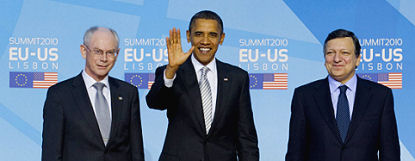
From David Ignatius, Washington Post: [A] big idea is taking shape that could revitalize the U.S.-European partnership for the 21st century. It was the talk of Berlin and Hamburg when I was there a week ago, and there’s a similar buzz in Washington. The idea is free trade — specifically, a trans-Atlantic free-trade agreement — which I’ll optimistically call “TAFTA.”
Secretary of State Hillary Clinton tipped the U.S. hand on Nov. 29 when she said at the Brookings Institution, “We are discussing possible negotiations with the European Union for a comprehensive agreement that would increase trade and spur growth on both sides of the Atlantic.” She noted the “long-standing barriers to trade and market access” that would have to be removed to make any such deal possible, such as the European Union’s protectionist agricultural rules.
Clinton is said to envision an “economic NATO” — a comprehensive agreement covering trade in goods, services, investment and agriculture. Indeed, a joint working group of U.S. and E.U. officials is about to release a final report arguing for such a comprehensive deal.
Curious as to whether Clinton’s speech was just window dressing from a departing secretary, I asked the White House this week whether the TAFTA talk is real. The answer was yes: Obama is considering making a trans-Atlantic trade initiative an important part of his second-term agenda. Combined with the North American Free Trade Agreement in Latin America and the Trans-Pacific Partnership in Asia, this could create a global trading system that might be an enduring part of Obama’s legacy. . . .
I like the idea of an “economic NATO” because it addresses fiscal problems through growth and expansion. The alternative “austerity pill” advocated by conservative Germans (and some American budget-cutters) is doomed to fail. Big, new spending initiatives are not a realistic growth strategy, either, given debt worries on both continents. To many economists, it’s a no-brainer: Expanded trade offers the best path to new jobs, markets and investment opportunities. . . .
[T]hough Americans fear that Asian competition will cost jobs, they support more trade with Europe. In a 2010 Pew survey cited by the GMF, Americans backed greater trans-Atlantic trade 58 percent to 28 percent. (Disclosure: I am a GMF trustee.) Even the AFL-CIO is said to back the idea of a TAFTA agreement. (photo: EU)
Image: su%2012%206%2012%20eu-us2010summit-pres.jpg
